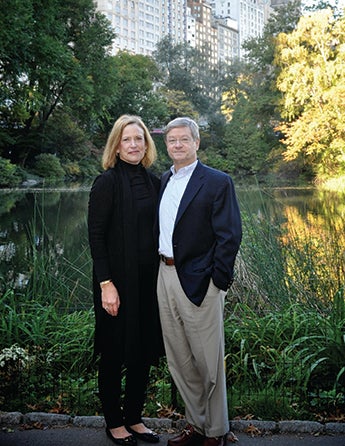 Meeting at a Thursday evening get-together at Mather House. Being one of the first classes of women to live in the Yard. Looking out at the Charles over dinner. These experiences might have been enough to inspire Pinney Allen ’76, JD ’79 and her husband, Charles “Buddy” Miller III ’74, JD ’77, to make a gift to Harvard.
Meeting at a Thursday evening get-together at Mather House. Being one of the first classes of women to live in the Yard. Looking out at the Charles over dinner. These experiences might have been enough to inspire Pinney Allen ’76, JD ’79 and her husband, Charles “Buddy” Miller III ’74, JD ’77, to make a gift to Harvard.
But their motivation goes beyond memories. Allen and Miller established a charitable remainder unitrust because they think it is a good investment—both in the transformative power of education and for their own retirement planning.
“We’ve included Harvard as a beneficiary of our will, but, since we know today what our assets are likely to be then, we decided to experience the joy—and investment benefit—of making some of that gift now,” says Miller. Their assets included stock, which would have carried substantial capital gains tax if they had sold them to diversify into other investments.
In speaking with staff in Harvard’s Office of Gift Planning and their advisor, they learned they could accomplish two goals with a gift of stock: they could support Harvard and receive a lifetime income stream through a charitable remainder unitrust. Administered by Harvard Management Company, the unitrust pays the donor 5 percent of the trust’s value, which is revalued annually.
“Harvard’s management is better than mine,” says Miller. “We’re not just getting the returns. Our principal should be growing. I don’t know a better risk-adjusted investment.”
Giving to Harvard also aligns with their philanthropic ideals. Over the years, they have designated support for professorships and financial aid.
“I want to make a gift because of the education I received and the doors it opened for me,” says Allen, who not only met her husband at Harvard, but also a roommate she corresponds with nearly every day. “I was lucky to have parents who supported me fully. In a sense, I look at this as finally paying for college, by giving back now.”
They want to ensure that talented students not only have access to the kind of education that the College can offer, but that Harvard continues to be a model for other institutions.
“It’s important for society that the student body at leadership schools like Harvard be as broad and representative as possible, ” says Miller.
After graduating from the College, Allen and Miller earned degrees at Harvard Law School and practiced law in Atlanta, Georgia, where they raised two daughters.
Miller has had a longtime career in telecommunications. After a nearly 30-year career in law, Allen became the head of school at the Atlanta Girls’ School, where she witnessed how financial aid resources help to build diverse communities and provide opportunities for talented students.
“We care about supporting education for bright and able people who otherwise aren’t in a position to get it,” says Miller. “We’re supporting that in every way we can.”
Education has been a consistent theme in their life’s work.
Says Allen, “Education has given us great advantages. It is the one great hope for changing the world.